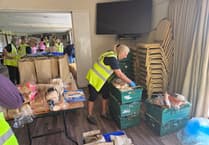Okehampton amateur historian Mike Wreford remembers his grandfather Walter Wreford, who served not just in the First World War but also in the Boer War. He was later involved in setting up Okehampton’s first hospital.
The celebrations of the end of the Great War on television, radio and in the press all showed the atrocious conditions, the conflict, loss of life and serious injuries which affected men from every town and village in the country and far beyond — and seemingly every family in some way or another.
The local press played a major part highlighting stories long forgotten, untold or lost in the mists of time.
My grandfather, Walter Wreford, fell into the last category as he served both in France during the Great War and before that, in the Boer War in South Africa, where he was at the Relief of Ladysmith and much else.
To me, growing up later on, he was my good friend and my hero.
My first recollection of him was aged five in 1938, when Mum and Dad brought me from our home in Plymouth to Okehampton for a week’s holiday. We stayed at March Court in East Street where Granfer lived with his invalid wife Jesse and daughter Doris (later Doris Buxton).
March Court was a busy place in those days, with Brays Dairy at No. 1 run by father and son Alfie and Ron Bray. No. 2 was the cobbler’s shop of Thomas Johns known as ‘tapper’ to friends and family alike.
He seemed to be there every hour of the day and night surrounded by assorted footwear, including Meldon Quarry boots, with the continual ‘tap’ as he worked away at his ‘last’.
No. 3 was my Granfer Walter’s house. The outside toilet was situated some 25 yards away, and with no water supply in the house, water was obtained from a communal tap over a granite trough adjacent to the foundation stone of 1847.
Without electricity, dusk meant work had to stop, as with oil lamps and candles it was a world of smoky illumination and shadowy and indistinct figures.
Every morning at 6.30 I was woken by Brays’ hand-drawn carts playing the same tune over the cobbles with the steel rims of the wheels and the clanging of the milk churns and bottles.
At the same time, Granfer would leave for Meldon Quarry where he worked as a blastman. He would walk up beside the railway track, or through the golf course, to Milehouse Farm to collect the horses to take to the quarry.
This was a tiring 11 or 12 hour day. He still found time, though, to teach me how to play draughts, as he was the Okehampton champion of the game.
Granfer was not an officer or NCO (non-commissioned officer) during his two spells in the army, but as an ordinary soldier he was honest, loyal and reliable and respected the royal family. He had a picture of General Sir Redvers Buller (the Boer War commander at Ladysmith who was, incidentally, born in Crediton) in the living room and I am sure that he stood to attention and saluted that picture every night.
We had the same holiday with Granfer in 1939, and by then I was much better at draughts!
However, just a short while afterwards, war was declared and Dad as a member of the Territorial Army was mobilised into the Royal Army Service Corporation.
After a short time in Plymouth he found himself in a convoy to Kent, spending some time with the army at different places around England before serving in Egypt and Italy.
Dad could not rest easy being away with bombing in Plymouth so Mum and I moved to Okehampton, where I began to spend more time with Granfer as he dug our garden and I joined him at our allotment, even more important with wartime rationing.
When I got into the grammar school, he was always there watching me playing rugby and cricket for the school. I progressed to various teams with Okehampton Argyle and with the formidable Okehampton Cricket Club. However I played, he would always assure me that I ‘had a good game’.
I spent a lot of time with him and it was a shock when he died suddenly in 1957 when I was 24.
I soon began to regret that I had never asked him about his life experiences, although this is a common fault with younger people.
It would have been most illuminating in view of his experiences in three major wars, education and life in Victorian times, the General Strike, the Depression and so much else, which he could have told me about and I would have recorded forever.
It was years later that I tried to put together details of his wartime service and his achievements in civilian and working life.
Granfer was born in Colebrook, not far away near Crediton, and after the normal Victorian education, he worked as a labourer before enlisting in the Devonshire Regiment on November 2, 1898. He left for South Africa on December 6, 1899, taking 36 days, including refuelling, to reach his destination.
In South Africa, he was at the Relief of Ladysmith and in relation to this, there is a piece of folklore which has been passed down through generations of the Bubear and Wreford families of Okehampton.
Ladysmith was under siege for 118 days before being relieved after several failed attempts.
The garrison of thousands of men were weak and emaciated through lack of provisions and water and were even reduced to slaughtering the horses for food.
Walter’s best friend Ted ‘Titch’ Bubear, of Northfield Road in Okehampton, was in the garrison and among others lining the streets of the badly damaged town when Walter marched in with the similarly exhausted Battalions of the Devonshire Regiment on March 3, 1900.
He immediately sought out Titch Bubear and gave him a precious tin of tobacco which he had carried all the way to South Africa for him.
In South Africa he was also involved in the campaigns/battles with the Devonshire Regiment at Tugela Heights and Laing’s Nek, the Orange Free State and the Transvaal.
After the end of the Boer War, Walter sailed home to England via India.
With the ‘call to arms’ at the outbreak of the Great War in 1914, Walter again enlisted, this time with his great interest being first aid in the Royal Army Medical Corporation.
My investigations here were hampered as many of the records were destroyed in the Blitz of 1942.
However, I know he was posted to France and was remustered into the 12 Royal Engineers.
I can only assume that this was due to his civilian work as a quarryman which made him suitable for digging the required tunnels and trenches.
At the end of the war he returned to work at Meldon Quarry, where he was also appointed first aid man. Now I had always assumed that with six days a week of physical hard work at the quarry amounting to some 70 hours a week, his allotment, watching Okehampton Argyle and the rugby and cricket clubs and his Saturday night pint, he would have had no time for other activities.
He found time to give support with consistent voluntary work for others, no doubt encouraged by his personal experiences in the Boer and Great Wars.
He was soon elected to the committee that for years had been trying to establish a hospital in Okehampton, in the days before the NHS.
In those more class conscious days, it must have been strange for him as the rest of the committee consisted of the mayor, alderman, councillors, doctors, clergymen and other leading citizens, but he was accepted with open arms being an important part of the team.
He was a proud man when the Okehampton and District War Memorial Hospital was officially opened on October 26, 1926.
He continued to devote all his spare energy to support other people and perhaps unusually he was elected to the committees of both the St John Ambulance and the British Red Cross and also the local ambulance association which ran the voluntary ambulance.
He was an officer of the Okehampton Oddfellows Friendly Society and the Oketon Social and Slate Club which both did good work in time of need.
He was also elected to the committee of the branch of the Royal British Legion which helped former soldiers and other members of the military after the two world wars.
Upon retiring from Meldon Quarry in 1946 after 40 years, he was elected as chairman of the Okehampton Old Age Pensions Association.
At his funeral in 1957, tributes were paid to a quiet and unassuming man who had devoted so much of this spare time to committees and organisations which benefited others.
Amongst those in the packed congregation paying their respects at the Okehampton Congregational Church were several members of the Bubear family, including Ted ‘Titch’ Bubear, the soldier and best friend to whom he had given that tin of tobacco, some 57 years previously at Ladysmith.




